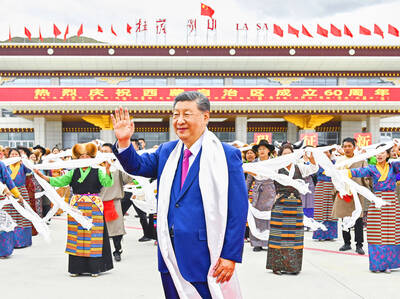Brazil's refusal to allow the Inter-national Atomic Energy Agency (IAEA) to fully inspect one of its nuclear facilities has heightened suspicions about its commitment to nonproliferation.
Although Brazil signed the Nuclear Nonproliferation Treaty in 1997 and said its nuclear program has peaceful objectives, suspicions over its commitment have simmered for more than a year.
They came to a head last week after the government confirmed that IAEA inspectors were denied access in February and last month to uranium-enrichment centrifuges at a facility under construction in Resende, near Rio de Janeiro.

PHOTO: AP
It cited the need to protect industrial secrets and said the centrifuges were, and will remain, off limits for visual inspection.
Science and Technology Minister Eduardo Campos said that Brazil had invested close to US$1 billion and years of research to develop its enrichment technology.
He said the performance of Brazilian centrifuges was 30 percent more efficient than those found in other countries.
"This is a technology we must protect," he said.
Centrifuges are used to enrich uranium for use in nuclear power plants or atomic weapons.
The doubts over Brazil's nuclear program were likely discussed during two days of closed-door meetings between Brazilian officials and the US Assistant Secretary of State for Nonproliferation, John Wolf.
Wolf left Brasilia on Thursday after two days of meetings of the Brazil-US Joint Committee on Nuclear Energy Cooperation.
Brazil's uranium-enrichment program may be discussed next week during a visit by US Energy Secretary Spencer Abraham.
When he arrived Friday in Rio de Janiero, Abraham said, "I don't want to leave the impression that the US and Brazil are not concerned about dirty bombs and terrorism. But I will not speculate on what topics will come up in my conversations with Brazilian officials."
According to the US State Department, those meetings should not be considered the result of "a reaction nor an expression of concern about Brazil's commitment to nuclear nonproliferation," said embassy spokesman Wesley Carrington.
But experts think concerns do exist over Brazil's commitment to nonproliferation.
"Brazil is beginning to be perceived as a country apparently wanting to reevaluate its commitment to nonproliferation and this is a big part of the problem at hand," said Jon Wolfsthal, deputy director for nonproliferation at the Carnegie Endowment for International Peace in Washington.
Its refusal to allow the inspections came "in the middle of Iran's and North Korea's challenges to the IAEA's authority," Wolfsthal said.
"Anything seen as undermining the IAEA's authority puts everyone on edge,'' he said.
Brazil's claim of protecting industrial secrets does not hold up because the IAEA has a "proven track record" of respecting such information.
Brazil's government laid plans for the development of nuclear weapons technologies in the 1970s when the country was governed by a military dictatorship whose leaders were oriented by a stern "national security" doctrine and a traditional rivalry with Argentina, which was also developing similar technologies during its military regime. But the plans were abandoned when Brazil returned to democracy in the 1980s.
Suspicions about the nuclear program started months before Luiz Inacio Lula da Silva became president in January, 2003.
"Why should we be asked to use slingshots while others point their cannons at us. Brazil will only be respected when it is strong economically, technologically and militarily," Silva said about the Nonproliferation Treaty.
Six weeks later, as president-elect, Silva said his government would never consider building an atomic bomb and respect the treaty.
Worries that Brazil's technology could fall into the wrong hands has also stoked international fears.
Brazil has the world's sixth-largest uranium reserve and has had the capacity to enrich uranium since the 1980s, but has so far only done so for research purposes.

Ten cheetah cubs held in captivity since birth and destined for international wildlife trade markets have been rescued in Somaliland, a breakaway region of Somalia. They were all in stable condition despite all of them having been undernourished and limping due to being tied in captivity for months, said Laurie Marker, founder of the Cheetah Conservation Fund, which is caring for the cubs. One eight-month-old cub was unable to walk after been tied up for six months, while a five-month-old was “very malnourished [a bag of bones], with sores all over her body and full of botfly maggots which are under the

BRUSHED OFF: An ambassador to Australia previously said that Beijing does not see a reason to apologize for its naval exercises and military maneuvers in international areas China set off alarm bells in New Zealand when it dispatched powerful warships on unprecedented missions in the South Pacific without explanation, military documents showed. Beijing has spent years expanding its reach in the southern Pacific Ocean, courting island nations with new hospitals, freshly paved roads and generous offers of climate aid. However, these diplomatic efforts have increasingly been accompanied by more overt displays of military power. Three Chinese warships sailed the Tasman Sea between Australia and New Zealand in February, the first time such a task group had been sighted in those waters. “We have never seen vessels with this capability

A Japanese city would urge all smartphone users to limit screen time to two hours a day outside work or school under a proposed ordinance that includes no penalties. The limit — which would be recommended for all residents in Toyoake City — would not be binding and there would be no penalties incurred for higher usage, the draft ordinance showed. The proposal aims “to prevent excessive use of devices causing physical and mental health issues... including sleep problems,” Mayor Masafumi Koki said yesterday. The draft urges elementary-school students to avoid smartphones after 9pm, and junior-high students and older are advised not

Chinese President Xi Jinping (習近平) attended a grand ceremony in Lhasa yesterday during a rare visit to Tibet, where he urged “ethnic unity and religious harmony” in a region where China is accused of human rights abuses. The vast high-altitude area on the country’s western edge, established as an autonomous region in 1965 — six years after the 14th Dalai Lama fled into exile — was once a hotbed for protest against Chinese Communist Party rule. Rights groups accuse Beijing’s leaders of suppressing Tibetan culture and imposing massive surveillance, although authorities claim their policies have fostered stability and rapid economic development in